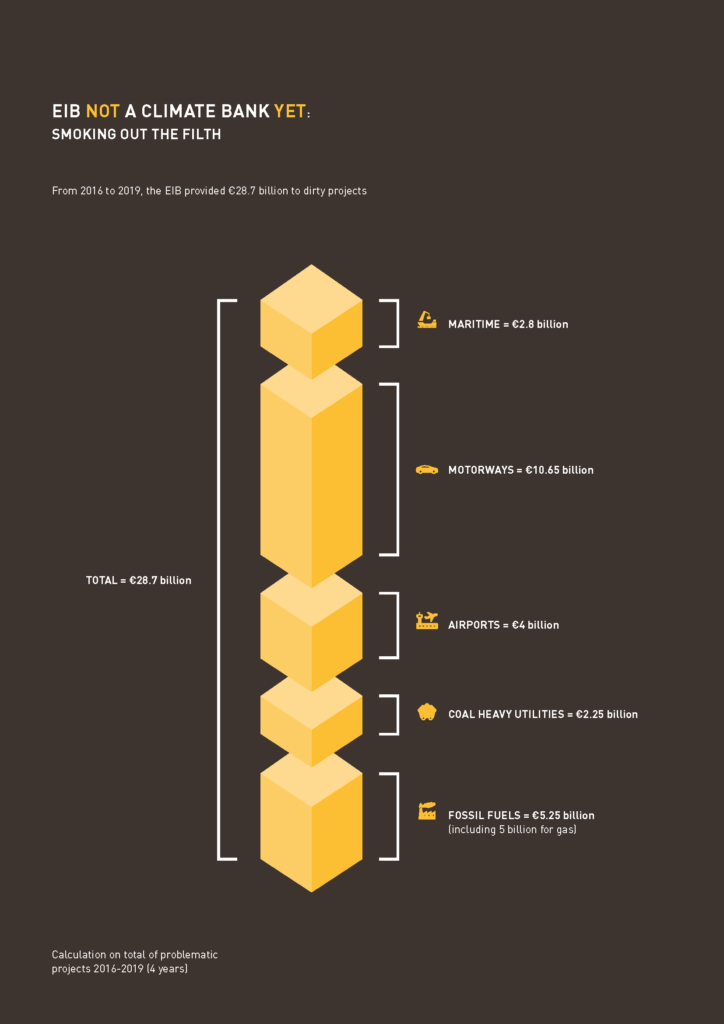As of today, the EIB (European Investment Bank) still supports numerous environmentally and socially detrimental projects, especially in the transport and energy sectors.

A transport policy in need of radical changes
The EIB’s Transport Policy is largely outdated and currently enables financing of polluting and carbon-intensive transport modes and infrastructure projects.
The EIB has been massively supporting roads, highways and motorways, with € 10.65 billion in loans given over the 2016-2019 period. In 2017, road transport was responsible for almost 72% of the total GHG emissions from transport at the EU level. Furthermore, the EU already has an extremely dense network of motorways and highways, many of which create severe problems of ecosystem fragmentation and disruptions in environmentally protected areas.
The EIB has also spent almost €3 billion (€2.828 billion) in maritime investment from 2016 to 2019. Although often omitted as a polluting transport sector, global shipping accounts for more than 2% of global GHG emissions. The EIB for example recently loaned € 140 million to support the expansion of the Port of Piraeus, Greece’s largest port now owned in large parts by the Chinese COSCO Corporation.
If the EIB is serious about becoming the “EU Climate Bank”, it must end its support to such heavily polluting projects and instead prioritize funding for zero-carbon transport modes, such as electric urban public transport, bike lanes and rail electrification.
Remaining loopholes in the Energy Policy
While the EIB’s energy policy, adopted in November 2019, is a key step forward, it contains three important exceptions that could undermine the realisation of its objectives:
1) The policy allows the EIB to continue approving projects from the 4th list of ‘Projects of Common Interest’ until the end of 2021, which contains over 50 new fossil gas projects.
2) It enables the financing of new, highly-polluting fossil gas infrastructure, on the basis of a vague promise that it will one day transport ‘cleaner’ gas.
3) The current threshold set for power generation remains extremely high and risks allowing gas power plants to receive EIB loans.
Even after the adoption of the new EIB energy policy, loans for fossil fuels projects have been moving forward. In June 2020, the bank approved loans for two new gas projects: a controversial gas terminal in Cyprus and a pipeline between Bulgaria and Serbia.
This is particularly problematic as adding any new gas projects risks locking us into a fossil fuel future for decades to come. Furthermore, there is ample evidence that the EU gas infrastructure is more than sufficient to meet demand, even in the event of extreme supply disruption cases.
The EIB also still indirectly supports coal through loans to polluting corporations. Despite having ruled out direct investment for coal in 2013, the bank has since then provided € 4.7 billion to companies with a high share of coal in their portfolios or that planned to develop new coal power capacity at the time of the loans’ approvals.
The EIB must deliver on its fossil fuels ban and eliminate all financing to fossil fuels in practice, and it must close the existing loopholes in its newly adopted energy policy.
Putting green conditions on EIB clients for their use of public funds
In a context where public money is flowing to rescue companies in the face of the COVID-19 crisis, the EIB currently does not specify any binding conditions for clients, including large corporates. The bank’s indirect support to coal shows that the EIB still gives support to highly polluting corporations.
Therefore, the EIB Bank must reinforce its approach to its clients in order to avoid what could, effectively, become blank cheques for highly-polluting activities that are completely misaligned with a 1.5°C scenario. It should demonstrate its climate commitment by making its support to companies conditional on them implementing Paris-aligned, science-based and time-bound transition plans.
Reinforcing safeguards in the field of bio-economy and agriculture
The current safeguards in the bio-economy, agriculture and land use sectors remain insufficient to prevent projects that worsen the climate crisis or harm biodiversity. In particular, there are no explicit bans for industrial farming and the burning of forest biomass for energy.
Using biomass for energy is often promoted as a solution to curb emissions, but the reality is that burning forest biomass is just as bad for the climate and the environment as burning fossil fuels. Burning forest biomass actually increases CO2 emissions per unit energy, relative to fossil fuels, and degrades crucial carbon sinks.
In the field of agriculture, EIB investments should contribute to a transition to more sustainable and resilient food systems, which are less dependent on external inputs, such as pesticides, fertilizers and antibiotics, and do not contribute to ecosystem destruction.